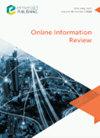你真可耻!在Facebook上发表的类似评论中,不礼貌和缺乏证据支持如何影响对群体成员和在线政治参与的评估
IF 3.1
3区 管理学
Q2 COMPUTER SCIENCE, INFORMATION SYSTEMS
引用次数: 0
摘要
目的:本研究考察了在没有证据支持的情况下,带有不文明行为的Facebook评论如何影响读者对评论者的评价和在线政治参与意愿。本研究也调查了不文明评论和无证据评论对网络政治参与的间接影响是否取决于党派关系的强弱。设计/方法/方法该研究使用了2(不文明的评论vs文明的评论)× 2(没有证据的评论vs有证据的评论)因子设计,并设计了一个场景,即在Facebook评论中阅读有关枪支管制问题的类似观点。研究结果表明,与文明的赞同评论相比,不文明的志同道合评论导致对评论者的负面评价水平更高,这反过来又降低了参与在线政治活动的意愿。接触无证据的评论导致对评论者的负面评价更多,但对在线政治参与没有显著影响。此外,党派关系的强度并没有显著调节不文明评论和没有证据的评论对在线政治参与的间接影响。虽然以前的研究已经证明了不文明和理性论证的显著影响,但人们是否以及如何评价内部成员的不文明和缺乏理性论证的评论却知之甚少。这些研究大多考察了政治背景下的不文明行为,但很少有人将这一背景扩展到志同道合的评论的影响上,尤其是当评论不文明且缺乏证据支持时。本研究旨在填补这一文献空白。本文章由计算机程序翻译,如有差异,请以英文原文为准。
Shame on you! How incivility and absence of supporting evidence in likeminded Facebook comments influence evaluations of ingroup members and online political participation
Purpose This study examined how likeminded Facebook comments with incivility and without supporting evidence influence readers' evaluations of the commenter and online political participation intention. This study also investigated whether the indirect effect of exposure to uncivil comments and comments without evidence on online political participation through evaluations of the commenters is contingent on the strength of partisanship. Design/methodology/approach The study used a 2 (uncivil comments vs civil comments) × 2 (comments without supporting evidence vs comments with supporting evidence) factorial design with a scenario about reading similar viewpoints about the gun control issue in Facebook comments. Findings The results showed that compared to exposure to civil agreeing comments, exposure to uncivil likeminded comments resulted in higher levels of negative evaluations of the commenters, which in turn decreased willingness to participate in political activities online. Exposure to comments without evidence led to more negative evaluations of the commenters, but it did not significantly influence online political participation. In addition, the strength of partisanship did not significantly moderate the indirect effect of exposure to uncivil comments and comments without evidence on online political participation through evaluations of the commenters. Originality/value Although previous studies have demonstrated the significant effects of incivility and reasoned argument, little is known about whether and how people evaluate ingroup members' comments that are uncivil and lacking reasoned arguments. Most of these studies have examined incivility in political contexts, but few have extended the context to the effect of likeminded comments, especially when the comments are uncivil and lack supporting evidence. The current study aims to fill this gap in the literature.
求助全文
通过发布文献求助,成功后即可免费获取论文全文。
去求助
来源期刊

Online Information Review
工程技术-计算机:信息系统
CiteScore
6.90
自引率
16.10%
发文量
67
审稿时长
6 months
期刊介绍:
The journal provides a multi-disciplinary forum for scholars from a range of fields, including information studies/iSchools, data studies, internet studies, media and communication studies and information systems.
Publishes research on the social, political and ethical aspects of emergent digital information practices and platforms, and welcomes submissions that draw upon critical and socio-technical perspectives in order to address these developments.
Welcomes empirical, conceptual and methodological contributions on any topics relevant to the broad field of digital information and communication, however we are particularly interested in receiving submissions that address emerging issues around the below topics.
Coverage includes (but is not limited to):
•Online communities, social networking and social media, including online political communication; crowdsourcing; positive computing and wellbeing.
•The social drivers and implications of emerging data practices, including open data; big data; data journeys and flows; and research data management.
•Digital transformations including organisations’ use of information technologies (e.g. Internet of Things and digitisation of user experience) to improve economic and social welfare, health and wellbeing, and protect the environment.
•Developments in digital scholarship and the production and use of scholarly content.
•Online and digital research methods, including their ethical aspects.
 求助内容:
求助内容: 应助结果提醒方式:
应助结果提醒方式:


